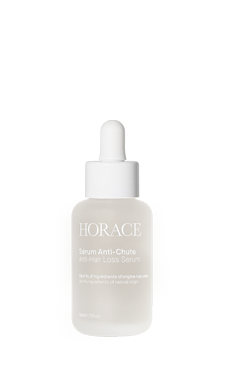

How to avoid seasonal hair loss
Photos DR
Words Camille Claudet
Share the article on
All you need to know about such hair loss and how to make your hair grow nicely again!
Seasonal hair loss is a common thing. Otherwise known as transient alopecia, it lasts about 4 to 6 weeks but can be extremely severe for some people and totally unnoticeable for others. A typical head of hair loses between 50 and 100 hair strands a day. You should only be concerned if you start losing more than this average.
Men experience a phase of hair growth called the "anagen phase", which lasts 2 to 5 years. This is followed by a resting period, also known as the "telogen phase", which lasts on average three months and during which the hair falls out – pushed out by the growth of new hair. This is followed by a new anagen phase. Temporary alopecia can be reactive or due to seasonality. Which one do you suffer from?
Reactive hair loss
Temporary alopecia can be caused by a specific or significant event. Indeed, a new diet, psychological or even physical trauma can cause abnormal hair loss. An illness or the treatments it requires can also be added to this list of causes. An overworked scalp is bound to be more sensitive. We therefore recommend avoiding at all costs unsuitable products that can attack your scalp. Don't panic, even if you notice an abnormal hair loss, it's nothing to worry about so long as you aren't also suffering from red patches, fatigue, or fever.
When the temperature drops…
When it comes to hair loss, autumn is the most common season, with the worst month being October. Why, you may ask. Because we experience a peak in hair growth in July, to protect our heads from the sun. Keep in mind that dead hair takes several weeks to fall out, and sometimes even up to 3 or 4 months. Autumn is therefore merely the end of a cycle. As is the case with our hormones, our scalp is affected by changes in temperature and luminosity. When the weather gets colder, humidity levels drop, and the scalp gets drier. Winter also means an increase in stress and tiredness, which influences the rhythm and speed of hair renewal.
…and increases again
Spring is the second most crucial period when it comes to seasonal hair loss. Days start getting longer, and while this is good news for anyone who enjoys grabbing a drink outside after work, it's bad news for your hair. Longer days mean lower melatonin production. This hormone plays a key role in your hair's health, which therefore ends up more fragile. On top of that, your whole body has to readapt to new weather and increased humidity levels. Once summer returns, hair starts growing faster. Exposure to the sun increases the secretion of the hormones that regulate hair growth, a little as it does on plants. However, remember to protect and nourish your hair, as the sun can damage both your skin and hair. Chlorine, sand, and salt are also a healthy scalp's enemies.
How to prevent hair loss
The first step is to use a good shampoo to clean and strengthen the scalp and hair. A gentle shampoo is your best bet. It won't attack your scalp, which means you can wash your hair frequently. For more volume and strength, choose a conditioner containing castor oil: its an ingredient known to slow down hair loss and even accelerate hair growth. Our fortifying conditioner contains castor oil and will give make your hair extra soft as a bonus.
Massage your head for a few minutes. This will activate microcirculation and stimulate hair bulbs, which fosters hair growth.
Eat a diet that is protein- and vitamin B-rich. These both help renew hair follicle cells. This means more wholegrain cereals, white meat, legumes, or brewer's yeast. Of course, as always, don't skimp on fruit and vegetables. An adequate supply of iron is also necessary as it contributes to the hair bulb's proper oxygenation. You can also treat yourself to a good seafood dish or scrambled eggs for breakfast.
If you don't want the fuss of changing diets, try food supplements. Hair can fall out due to a lack of minerals such as iron. Begin your treatment just before autumn or spring: this will slow hair loss and give the body what it needs.
Things you should avoid
First off, wash your hair with warm water and dry it at reasonable temperatures. Most importantly, avoid going out with your hair still wet, as hair tends to react poorly to extreme temperature variations.
As far as your diet is concerned, avoid saturated fatty acids. In other words: reduce your intake of animal products such as butter, cream, or cheese, as well as pre-cooked, pre-fried, or pre-breaded products to the bare minimum. We know, it's not going to be easy.
Ban all silicone and sulphate-based treatments from your bathroom. They are a healthy scalp's sworn enemies. They will clog its pores and attack it.
Hair loss can be countered or stopped with natural products and a good diet. However, these will affect the new hair growth and not the existing hair in its telogen phase. If your hair loss lasts more than three months or your scalp becomes more visible every day, don't wait to see a specialist: your hair loss might be anything but seasonal.
